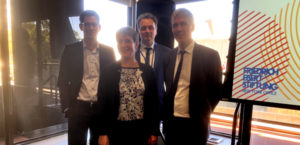The IDOS project on the United Nations (UN) development system presented a new study on China’s growing engagement in the UN development pillar in New York.
The launch event, organised in cooperation with the Friedrich-Ebert-Stiftung, was fully booked with about 60 participants from among diplomats, UN staff and experts.
China’s behavior in the UN has given rise to controversial assessments in recent years: On the one hand, the growing role of China as a superpower is linked to expectations that China’s involvement will strengthen the UN. On the other hand, anecdotal evidence gives cause for concern that China is pursuing more strongly and directly its own national interests in the UN development pillar, thus challenging existing norms and structures. The study now presented by Max-Otto Baumann, Sebastian Haug, and Silke Weinlich provides the first comprehensive overview of China’s financial, personnel, and political engagement in the UN development pillar. The conclusion is mixed: Overall, China has so far pursued a restrained and largely constructive course in UN development matters. At the same time, where Chinese interests are involved, a decidedly power-political approach poses risks to the integrity of multilateral processes in the UN.
The commentator, Sarah Cliffe of the Centre for International Cooperation at New York University, praised the study as a helpful contribution to a highly political debate. She also praised the recommendations for a more nuanced approach to China. The study argues that, first, alliances should be formed to defend the UN’s values and norms, which also requires Western states to be more credible in their global posturing. Second, opportunities for cooperation with China to solve global problems should be sought and seized. Third, states should protect the integrity of multilateral processes and institutions and develop a multilateral code of conduct that sets limits on bilateral influence.


